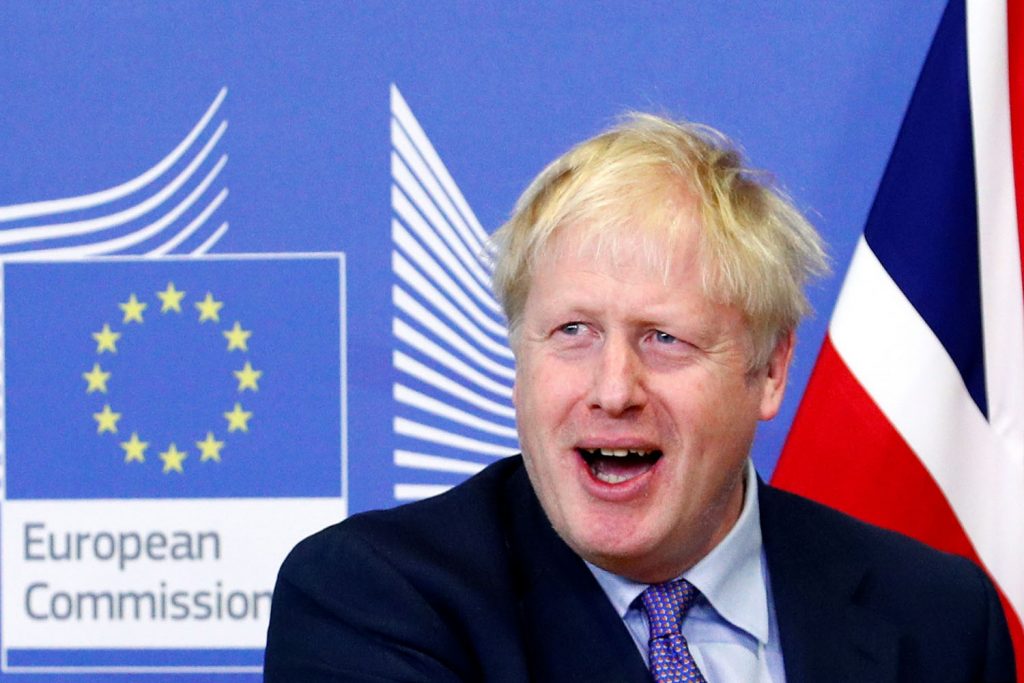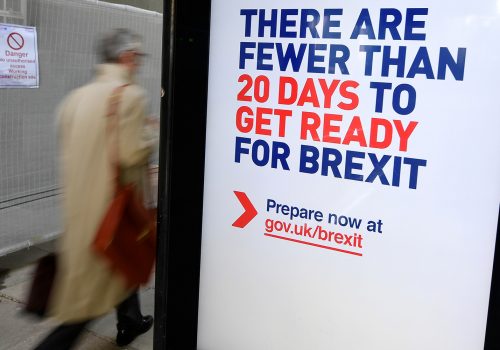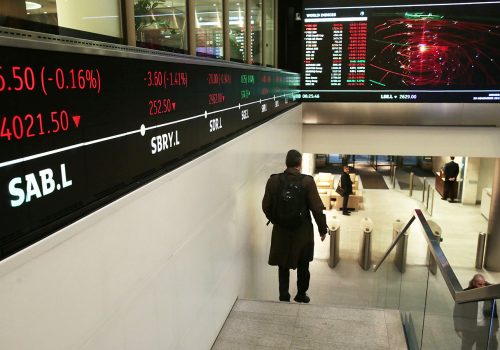British Prime Minister Boris Johnson has indeed pulled off a remarkable coup in securing an agreement on October 17 for Britain to leave the European Union in just two weeks’ time.
But he now faces some equally daunting challenges. He must either secure immediate parliamentary approval for his “great new deal” in a vote expected as early as October 19, or face his possible ouster in a no-confidence vote, or be forced to hold a confirmatory referendum on the deal, or witness the country plunged into a general election while his deal remains in abeyance.
So the prime minister has less than forty-eight hours to forge a coalition that can secure the necessary initial approval of the deal—and Britain’s fractured politics means the outcome of the vote is far from certain.
Johnson secured his deal in the early hours of October 17 by effectively agreeing to a customs and regulatory border between Northern Ireland and the rest of the United Kingdom. He did this in order to ensure that no such border would re-emerge between Northern Ireland and the Republic of Ireland that would put at risk the 1998 Good Friday Agreement that officially ended thirty years of sectarian and political strife in the North.
In the process, however, he lost the support of the Democratic Unionist Party (DUP) of Northern Ireland, and the DUP’s ten MPs at Westminster could well determine the future of Boris’s deal when it comes before the House of Commons on October 19.
Johnson needs to secure 320 votes to win initial approval for the deal. But his ruling Conservative Party currently numbers just 288 MPs, and a hardline group of perhaps twenty to twenty-five MPs, dubbed the Spartans, share the DUP’s concerns that different customs and regulatory regimes in Northern Ireland and Great Britain threaten the cohesion, and possibly the unity, of the United Kingdom.
Over the next couple of days, the Government will exert massive efforts to win over both the DUP and the Spartans, possibly including pork-barrel promises of fresh financial aid for Northern Ireland and a combination of threats and promises to the recalcitrant Conservative Spartans.
But it also hopes to secure support from two other key groups. One is from the group of twenty-one former Conservative MPs who were expelled from the party in September when they backed legislation aimed at ensuring the UK would not be able to leave the EU on October 31 unless a deal was first agreed. The other group are some ten to twenty Brexit-inclined opposition Labour MPs who represent areas that voted ‘Leave’ in the advisory referendum on Brexit held in 2016.
At present—and who knows what may happen before voting actually takes place—it looks as if Johnson will go down to defeat if he seeks to secure approval for his deal in an un-amended form.
But a change of policy by opposition Labour leader Jeremy Corbyn on October 17 has changed the arithmetic concerning a key potential amendment to the bill required to get the deal through parliament. Corbyn declared on October 17: “The best way to get Brexit sorted is to give the people the final say in a public vote.” This makes it likely that the House of Commons will not only seek to tack on a compulsory second referendum to the Government’s legislation, but that such an amendment will actually pass since it would be backed not only by Labour and the Scottish and Welsh Nationalists, but also by many of the former Conservative Party independents.
If Johnson’s deal goes down to a straight defeat, much will depend on the prime minister’s immediate response. If he accepts defeat with a modicum of grace and conforms to the no-deal legislation passed in September, he will immediately send a letter to the European Commission asking for an extension to the departure timetable to the end of January 2020.
In such a case, he might well face immediate opprobrium from his own supporters for failing to deliver on his consistently repeated promise that the UK would leave the EU on October 31. But he could—and in all probability would—then call a general election for late November or early December. Since Johnson, like his presidential namesake in the United States, certainly understands political counting, this may not be just a default position but an actual strategic objective: force the opposition to vote his deal down and take his case to the people that it is the opposition, and not the prime minister, that has failed to deliver Brexit on time.
However, Johnson also faces the possibility of losing a confidence vote. The Scottish National Party has already said it will call one if the Government loses a vote on the deal, and other opposition parties might well support it if Johnson is either reluctant to send the required letter to Brussels or seems to be maneuvering to find some way of circumventing its provisions in order to ensure that the UK does indeed leave the EU on October 31—but without a deal.
There are still all sorts of loose ends to be tied up. While the heads of government gathered in Brussels for the European Council meeting on October 17 and 18 gave their formal blessing to the deal, the UK Parliament and the European Union Parliament have to sign off on the details of a vastly complicated set of arrangements that would unravel forty-five years of British membership of a host of European institutions.
As for the deal itself, while Johnson can certainly claim credit for securing a last-minute agreement, its details may well contribute to a further fracturing of British politics. In particular, Labour and the nationalist parties consider that workers’ rights and conditions are threatened because an accompanying political statement makes it clear that the Johnson Government will no longer work to secure a customs agreement with the EU, the goal of his predecessor Theresa May, but a free trade agreement that would allow the UK to set its own standards and regulations.
So the UK awaits the start of a great debate on October 19—and wonders just what might happen in the meantime.
John M. Roberts is a UK-based senior fellow in the Atlantic Council’s Eurasia Center and Global Energy Center.
Further reading
Image: Britain's Prime Minister Boris Johnson speaks during a news conference with European Commission President Jean-Claude Juncker after agreeing on the Brexit deal, at the sidelines of the European Union leaders summit, in Brussels, Belgium October 17, 2019. REUTERS/Francois Lenoir



